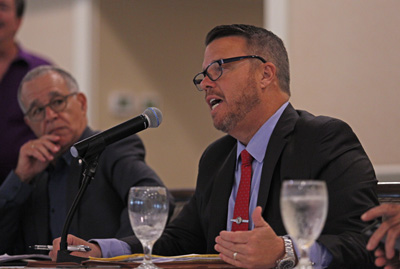
Newly elected Councilman Joe Graves has already begun making waves on the Vero Beach City Council, challenging the validity of the city’s certification of election results and the appointment of the mayor and vice mayor.
At his first city council meeting on Nov. 19, Graves, a well-known local lawyer, clashed with City Attorney John Turner over the legality of the canvassing board’s certification of election results after the board adjourned before it took its formal vote.
Graves said that action was not legal and went on to question whether the city actually had a mayor and vice mayor because public comment was restricted the previous day when the city council chose Tony Young as mayor and Laura Moss as vice mayor.
“The canvasing board adjourned at 10:06 a.m. and it wasn’t until after the adjournment that the motion to adopt the resolution certifying the election results was made and then voted upon,” Graves said.
“How does an adjourned board vote on something?” he later added.
Turner – after taking a 10-minute recess to review an existing ordinance on the matter – deemed the results were certified. The ordinance, according to city documents, makes no mention of procedural order. The Indian River Supervisor of Elections has already certified the election results.
“That procedure, although it would have been better had it been adopted before the adjournment does not undo what was done – it does not adversely impact and make what was done improper or illegal,” Turner said.
Despite that legal opinion, the canvassing board reconvened the following Thursday morning to again certify the results of the election in which Graves and Rey Neville won vacant seats on the council.
Graves also questioned if the appointment of mayor and vice mayor was legitimate since former Councilman Brian Heady was restricted by Turner from making a public comment during the ceremony. Graves cited state law stipulating the public shall be given a reasonable opportunity to be heard before a board or commission. Heady was escorted out of council chambers by Vero Beach Police Chief David Currey after arguing he had a right to speak.
“He had backbone enough to stand up to other authorities and do the right thing,” Heady said of Graves during Thursday’s second certification. Heady – who has also questioned the competency of Turner over the snafu – was among the field of eight candidates who ran against Graves and Neville in the Nov. 5 election.
The unexpected discussion at the newly constituted council’s first meeting initially left council members confused as to whether Graves and Neville were legitimate members of the board and could cast votes. Turner, however, assured the board the two new members were indeed official council members.
“Probably one attorney for the city council is enough, and I mean that with all due respect,” Moss said during the exchange between the two lawyers, Graves and Turner.
Continuing his energetic debut, Graves successfully lobbied the council to change its meeting time from every first and third Tuesday at 3 p.m. or 5 p.m. to 8:30 a.m., effective Dec. 3, and requested a discussion about establishing a stormwater utility to create a funding source for infrastructure repairs and stopping runoff into the lagoon be held at a future workshop. The request was granted by his fellow council members.
Graves also proposed the council pass a resolution directing Turner to write a legal opinion as to whether the city has any say on how tourism tax dollars are allocated by Indian River County.
The rest of the council concurred, and Turner said he would investigate the matter. The county collects a four percent tourism tax, also known as a bed tax, which funds services such as tourism promotion and beach restoration. At least half the tax is paid in the city but the county controls all the revenue.
“What’s puzzling to me is that there’s not a remedy within the statute if the city doesn’t agree with how the taxpayer funds are determined to be utilized by the county, when 50 percent of the taxes are accumulated within the city,” Graves said. “It seems somewhat unfair.”



